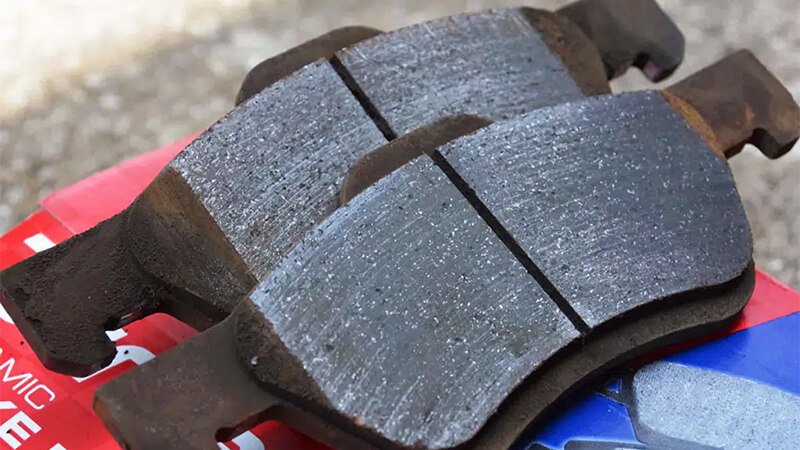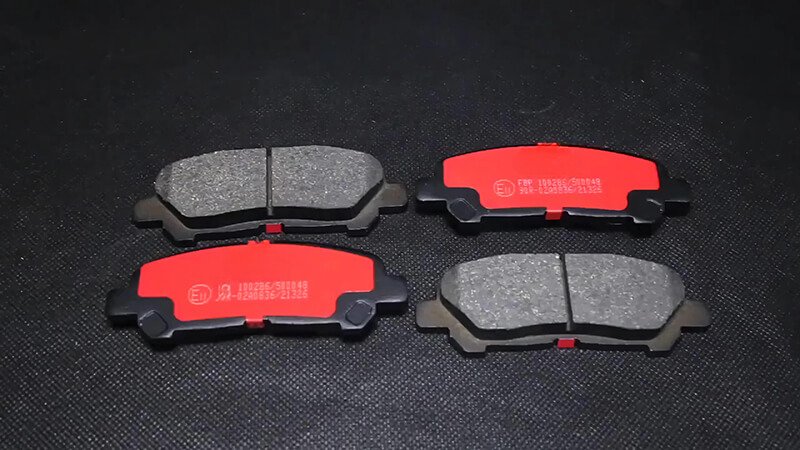Modern brakes are clever but simple. They make one part age fast so the rest of the system stays healthy. That ageing part is the brake pad.
Brake pads wear out faster than rotors because pads are softer and grip harder. They hold the heat, take the friction, and spare the rotor from damage, so we replace pads often and rotors less.
I see this design choice as smart engineering. It keeps drivers safe and helps distributors plan stock. Let us explore each key question in depth.

Do brake pads wear faster than rotors?
City garages say the same thing: pads vanish, rotors survive. They are right.
Pads wear faster because their compound is softer than the cast‑iron rotor. The pad converts energy to heat, then sheds material to release that heat. The rotor stays cooler and harder, so its surface lasts longer.
Dive deeper: how design forces pads to sacrifice
Pad vs. rotor hardness
Pads sit around 60–80 BHN on the Brinell scale1. Rotors reach 180–220 BHN. That gap means pads “give” first.
| Part | Typical Hardness (BHN) | Main Function |
|---|---|---|
| Pad | 60–80 | Grip and wear |
| Rotor | 180–220 | Stay rigid, disperse heat |
Heat paths inside a brake
At 100 km/h a medium sedan stores about 160 kJ in its rotors during one hard stop. Pads absorb most of that first. They fade, smoke, and lose a hair‑thin layer, but the rotor only warms up. This energy trade2 saves the rotor face.
My field story
A UK fleet vet once showed me pads cut in half by 35 000 km, rotors still smooth. He said, “Cheaper to swap pads twice than rotors once.” He was right. Pads cost a tenth of rotors and take fifteen minutes to fit. This rule guides my stocking plans at Runex.

What is the 30/30/30 rule for brakes?
Many shops rush the first test drive and glaze new pads. The 30/30/30 rule stops that.
The rule is simple: perform 30 gentle stops from 30 km/h with 30 seconds between stops. This beds the pad to the rotor, spreads the friction film, and locks pad life into place.
Dive deeper: why bedding saves money
The science of transfer layers
During bedding3, pad resin melts and coats the rotor with a thin grey film. That film lets pad and rotor operate as one “friction pair.” If you skip bedding, the pad skids on raw iron, spots glaze, and wears in peaks.
| Bedding Stage | Pad Surface Change | Rotor Surface Change | Risk if Skipped |
|---|---|---|---|
| Cold laps | Resin warms | Light film starts | None |
| Mid sequence | Resin flows | Film spreads evenly | Mild glazing |
| Last laps | Pad face matches | Film stabilises | Heavy glazing |
Cost impact for distributors
Glazed pads come back as warranty claims. One return shipment can wipe out margin on fifty sets. By adding a clear 30/30/30 leaflet in every Runex box, I cut claim rates4 for a Spanish partner from 4 % to under 1 %.
Data snapshot
Below is the difference in claim rate before and after we enforced the rule:
| Month | Claims per 1 000 Sets (Before) | Claims per 1 000 Sets (After) |
|---|---|---|
| Jan | 5.2 | 1.3 |
| Feb | 4.7 | 1.1 |
| Mar | 4.4 | 0.9 |
Clients see the drop and stay loyal.

What lasts longer, brake pads or rotors?
Every buyer asks this while arranging stock levels. The answer lets them balance shelf space and cash.
Rotors last longer. Pads need changing at 30 000–50 000 km in mixed driving, while rotors go 60 000–100 000 km if kept within wear limits and not overheated.
Dive deeper: planning inventory around life cycles
Life‑cycle timeline
| Mileage (km) | Common Service | Part Swapped | Notes |
|---|---|---|---|
| 0 | Fit new set | Pads + new rotor pair | Full refresh |
| 30 000 | Inspect pads | May swap pads | Rotor usually fine |
| 60 000 | Second pad swap | Check rotor thickness | Turn or replace if below min |
| 90 000 | Third pad swap | Rotor often replaced | Full refresh again |
Shelf strategy
For each rotor reference I keep one pallet in stock. For its matching pad reference I keep three. My data shows pads move 2.7 × faster than rotors5. Holding too many rotors ties cash. Rotors are heavier, costlier to ship, and less likely to fail suddenly.
Cash flow view
| Item | Average Unit Cost6 | Units per Pallet | Tie‑up Capital per Pallet |
|---|---|---|---|
| Pad Set | €12 | 300 | €3 600 |
| Rotor Pair | €40 | 64 | €2 560 |
Even though rotors cost more each, pallets of pads freeze more cash. My rule: keep pad pallets moving every 45 days, rotor pallets every 90 days.

Why are my brake pads wearing so quickly?
When pads vanish in 10 000 km, customers blame the part. Often the cause lies elsewhere.
Fast wear comes from harsh driving, wrong material, sticky calipers, or mismatch between pad and rotor hardness. Solving the root cause, not swapping brands, fixes the issue long term.
Dive deeper: tracing fast wear like a detective
Step‑by‑step checklist
| Checkpoint | Symptom | Likely Cause | Fix |
|---|---|---|---|
| Pad edge tapered | One side thinner | Caliper slide jammed | Clean and grease guide pins |
| Pad glazed shiny | Low friction, squeal | High heat, no bedding | Re‑bed or replace pads |
| Rotor scoring | Deep grooves | Pad worn to metal, debris trapped | Replace pads and rotors |
| Uneven pad set | Inner wears faster | Sticking piston | Rebuild caliper |
| Dust heavy/black | Aggressive pad compound | City stop‑go with semi‑metallic | Switch to ceramic compound |
Case study: courier vans
A courier fleet in Manchester reported pads fading in 9 000 km. We logged driver data: each van made 250 stops a day, full load, many downhills. We moved them from semi‑metallic to ceramic pads7 and added cooling slots to rotors. Pad life doubled to 18 000 km. Rotor life stayed unchanged.
My test bench insight
On our dynamometer I run pads at 500 N clamp force, 400 °C peak. Semi‑metallic loses 15 % friction after 250 stops, ceramic loses 5 %. That small gap turns into thousands of kilometres on the road.

Conclusion
Brake pads 8 wear first by design. They shield the rotor, keep stopping power high, and save the user bigger bills. By understanding material hardness, bedding rules, life‑cycle math, and failure patterns, I can guide clients to the right mix of pad and rotor stock. Clear data, simple tables, and real stories prove the point: smart planning turns rapid pad wear from a pain into a predictable, profitable routine. With Runex Auto, I keep that routine reliable so distributors like Joe Rich meet deadlines, cut claims, and drive customer trust.
-
Understanding the Brinell scale is crucial for evaluating material hardness, especially in automotive applications. Explore this link to deepen your knowledge. ↩
-
Learning about energy trade in brake systems can enhance your understanding of vehicle performance and safety. Check out this resource for insights. ↩
-
Understanding bedding is crucial for optimal brake performance and longevity. Explore this link to learn more about its significance. ↩
-
Reducing claim rates can significantly improve profitability. Learn effective strategies to minimize warranty claims in this insightful article. ↩
-
Understanding the dynamics of pad and rotor wear can optimize inventory management and service efficiency. ↩
-
Exploring Average Unit Cost helps in making informed decisions about pricing and inventory strategies. ↩
-
Explore the advantages of ceramic pads, including improved longevity and performance, which can enhance your vehicle's braking efficiency. ↩
-
Find the best brake pads from Runex, and clicking this link to get your best solutions and the best price. ↩













